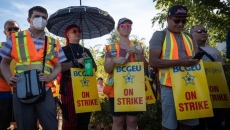LANGFORD, B.C. - The squeeze of global inflation has prompted the British Columbia government to spend $600 million to boost a tax credit and increase family benefits for low- and moderate-income residents.
Premier John Horgan announced the province is also capping rent increases at two per cent for 2023 instead of the rate of inflation.
Join Premier John Horgan and Selina Robinson, Minister of Finance, for an announcement about cost of living supports. https://t.co/0ZgmUbKHYE
— BC Government News (@BCGovNews) September 7, 2022
Horgan says inflation is driving up the costs of groceries, gas and other goods and services, and the next support measures will offer families a cushion during challenging times.
About 85 per cent of people in B.C. are expected to benefit from the increase in the Climate Action Tax Credit payment, estimated to be worth up to $1,500 a year for a family of four.
The B.C. Family Benefit will also rise by as much as $58.33 a month for each child under 18 years old.
No one needs to apply for the enhanced credit and family benefit because the temporary increases will be automatically received if a person's income tax filing is up-to-date.
The government said last month it was preparing to introduce a series cost-of-living initiatives, starting with a $60-million education affordability fund to ease the burden of back-to-school costs.
That fund will expand school meal programs and help families pay for supplies and field trips in an effort to take the sting out of school costs.
Finance Minister Selina Robinson foreshadowed the government’s cost relief plans last month when she delivered last year’s final budget numbers, which included a surplus of $1.3 billion after earlier projections of a deficit nearing $10 billion.






